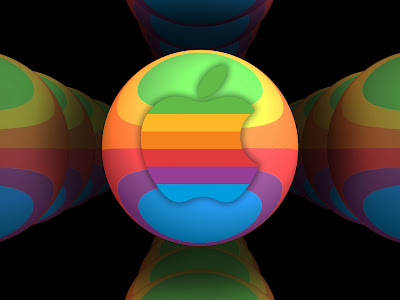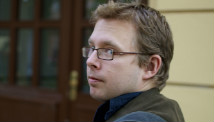It's hard to believe, but there was a time when Apple's computers were accused of being strictly last generation.




Their computers were made with clunky Power PC processors, and Windows PC owners smirked at the wheezing Mac platform. Michael Dell even famously said the whole company was so behind the times that if it were up to him, he'd euthanize it.
How things change.
While the rest of the
industry was counting Apple out, a Steve Jobs newly returned to Apple
spent the early part of the last decade quietly assembling a time
machine. Following the iPad, iPhone and MacBook Air before it, the retina-display MacBook Pro
announced Monday at the Worldwide Developers Conference in San
Francisco is just the latest time traveler Apple has sent back to us
from the future.
John Brownlee
It's a machine so shiny,
so shimmering, so futuristic, so unlike anything else out there that it
will take the PC-making competition at least a year to release a truly
competing product. How did this even happen? How did Apple assemble its
time machine, and why can't the likes of Sony, HP, Dell, Acer and Lenovo
seem to catch up?

There's no flux capacitor
involved, and although Apple's design team, led by Jony Ive, is truly
visionary, there are lots of companies with revolutionary visions of the
future of computing. The difference between Apple and other computer
makers is that Apple can actually build the revolutionary, magical
machines it dreams up.
That's Apple's real mojo.
They can actualize. Apple can say to themselves that they are going to
revolutionize the professional laptop, or the smartphone, or the tablet,
and then not only follow through with an enviable purity of design,
source all of the parts and manufacture their product in utter secrecy,
then ship the resulting en masse and sell them at unheard of profit margins. No one else can.
It's all in Apple's mastery
of the supply chain, which is Tim Cook's particular genius. His
strategy is simple: When Apple decides to go ahead and make a
revolutionary new product, it buys up literally almost all of the
world's stock of the components that define the gadget. This not only
gives Apple massive discounts in component prices, because they are
buying in extreme bulk, but it also prevents the competition from
quickly releasing clones of Apple's iconic machines, or matching Apple
in price without cutting corners.
It happens time and time
again. When Apple first released the iPhone, it took the smartphone
industry a year to release a phone that was even competitive,
spec-for-spec, by which time Apple had already unveiled the iPhone 3GS.
Hardware manufacturers trying to compete with
Apple constantly discover that they can only build competing devices
off of Apple's rejected parts, or else build new factories from the
ground up to manufacture the parts they need.
Look at the iPad. It has no competition,
2½ years in. Last quarter, Apple sold almost 12 million iPads.
Comparatively, Apple's biggest competitor -- Samsung -- sold 1.1 million
tablets. Why? Companies simply can't build products as good, or Apple's
stranglehold on the manufacturing supply chain prevents them from doing
so.

Then there's a MacBook
Air. We're starting to see competitive ultrabooks a year and a half
after Apple unveiled the second-gen Air, but that's only after Intel reportedly set up a massive $500 million subsidy fund to help PC makers build a MacBook Air clone.
The new retina-display
MacBook Pro is another such product. It's a beast of a machine all
around, but its defining feature is a high-resolution display with 220
pixels per inch, each smaller than the acuity of the human eye. It's far
and away the best display of any notebook or even desktop on the
market, and you can bet that Apple is in control of most of the world's
supply of the panels necessary to make a machine that even comes close
to competing.
There's a famous Ray
Bradbury story called "A Sound of Thunder" in which a man travels into
the prehistoric past, accidentally squashes an insect underfoot and thus
indelibly changes the future forever. Apple is that time traveler. The
prehistoric insect is the competition. Apple crushes it underfoot with
calculated purpose, and that is how the future of computing is once
again forever changed.
No comments:
Post a Comment